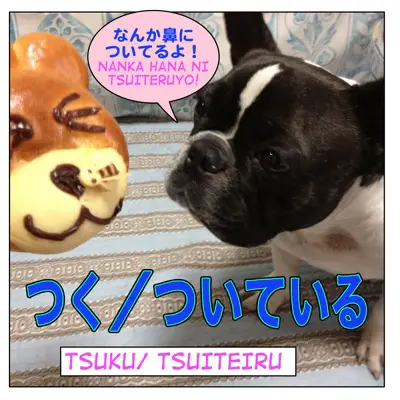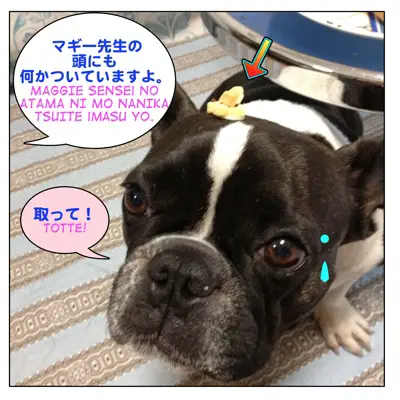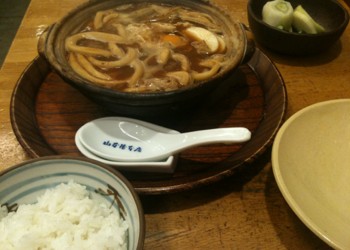
「なんか鼻についてるよ!」
= Nanka hana ni tsuiteruyo!
= You have something on your nose!

「マギー先生の頭にもなにかついていますよ。」
= Maggie sensei no atama nimo nanika tsuite imasuyo.
= You have something on your head, too, Maggie Sensei.
「取って!」
= Totte!
= Get rid of it!
Hi everyone,
Today’s lesson is a verb ついている( = 付いている)( = tsuite iru)
![]() dictionary form : 付く= つく= tsuku)
dictionary form : 付く= つく= tsuku)
There are so many meanings and idioms using つく( = tsuku) but I will focus on a few major usages in this lesson.
1) to stick to something, to have something on the surface, to leave some mark, to stain,
See the pictures? There is something on the bear’s nose.
「なんか鼻についてるよ!」
=Nanka hana ni tsuiteruyo!
= You have something on your nose.
Note : casual contraction called い抜き言葉 = inuki kotoba= the words which skips い(=i)
In casual conversation, we sometimes drop い ( = i) so instead of the standard 「ついている」 you’ll see 「ついてる」.
It is considered grammatically wrong but people say that all the time so I will use it in this lesson.
★ついている ( = tsuite iru)
![]() casual contraction
casual contraction
*ついてる( = tsuiteru)
(negative form )
★ついていない ( = tsuite inai)
![]() casual contraction
casual contraction
*ついてない ( = tsuitenai)
******
「マギー先生の頭にもなにかついていますよ。」
= Maggie sensei no atama nimo nanika tsuite imasuyo.
= You have something on your head, too, Maggie Sensei.
「取って!」
= Totte!
= Get rid of it!
******
Ex. ドレスにクリーニングのタグがついているのを知らずに一日過ごした。
= Doresu ni kuriiningu no tagu ga tsuiteiru no wo shirazu ni ichinichi sugoshita.
= I spent the whole day — never noticing that I had a dry cleaner’s tag on my dress.
Ex. ほっぺたにご飯粒がついてるよ。
=Hoppeta ni gohantsubu ga tsuiteruyo.
= You have a grain of rice on your cheek.
Note: ついてる( = tsuiteru) ←(casual contraction) ついている( = tsuite iru)
If you want to stress the stickiness, you use くっつく( = kuttsuku)
Ex. 靴の底にガムがついた。
= Kutsu no soko ni gamu ga tsuita.
= Gum stuck to the bottom of my shoes.
:u:
* 靴の底にガムがくっついた。
= Kustu no soko ni gamu ga kuttsuita.
Ex. コートにシミがついていますよ。
= Kooto ni shimi ga tsuite imasu yo.
= You got a stain on your coat.
Ex. 手にペンキがついた。
= Te ni penki ga tsuita.
= I got some paint on my hand.
2) to accompany, to come with something extra, to be attached
Ex. この車にはナビがついている。
=Kono kuruma niwa nabi ga tsuite iru.
= This car has a navigation system.
Note: You could also say:
この車にはナビがある。/ ない。
= Kono kuruma niwa nabi ga aru.
= There is/isn’t a navigation system in this car.
= This car has a navigation system.
The translation is the same but ある means ” to have ~ , there is / are ~ “. We use them when we talk about the existence or possession of something.
When something is attached to ~, installed, included, comes with ~ or contains ~, you use, ついている ( = tsuite iru)
So この車にはナビがついている means “This car got the navigation system “attached”. (=This car has a navigation system.)
Ex. このホテルの部屋にはテレビがついていない。
= Kono hoteru no heya niwa terebi ga tsuite inai.
= This hotel room doesn’t come with a TV.
When you just talk about whether or not you have a TV in your house, you can simply say:
*うちにはテレビがない。
= Uchi ni wa terebi ga nai.
= We don’t have a TV in my house. / There isn’t a TV in my house.
When you just talk about if you have a TV or not in your house.
If you say
*うちにはテレビがついていない。
= Uchi ni wa terebi ga tsuite inai.
= My house doesn’t come with a TV.
It sounds funny because ついている ( = tsuiteiru) means “to come with” and is often used for an additional service.
Ex. 私の携帯(電話)にはカメラがついていない。
= Watashi no keitai (denwa) niwa kamera ga tsuite inai.
= My cell phone doesn’t have a camera. (←My cell phone doesn’t come with a camera.)
Ex. 新しいモデルにはたくさんの機能がついています。
= Atarashii moderu niwa takusan no kinou ga tuite imasu.
= A new model has a lot of features.
Ex. その部屋にはお風呂がついていますか?
= Sono heya niwa ofuro ga tsuite imasuka?
= Does that room have a bathroom?
Note: If you say ありますか ( = arimasuka), you simply asks the existence of the bathroom in the room. (Is there a bathroom in the room?)
Ex. どの製品にもバーコードがついています。
= Dono seihin nimo baakoodo ga tsuite imasu.
= Do all products have barcodes? (←Bar-codes are attached to any products.)
Ex. このメニューにはドリンクがついていますか?
= Kono menuu niwa dorinku ga tuite imasuka?
= Does this dish come with a drink?
Ex. 「味噌煮込みうどんにはご飯がついています。」
= Misonikomi udon niwa gohan ga tsuite imasu.
= This miso noodle comes with rice.
↓ (If you come to Nagoya, try this noodle! ) 😉

Ex. この雑誌には化粧ポーチがついています。
= Kono zasshi niwa keshou pouchi ga tsuite imasu.
= This magazine comes with a makeup bag (as a gift).
Note: You can use ついてくる( = tsuite kuru) to come with ~
Ex. 今、この雑誌を買うと化粧ポーチがついてきます。
= Ima, kono zasshi wo kau to keshou pouchi ga tsuite kimasu.
= (Literally) If you buy this magazine, it comes with a makeup bag.
= If you buy this magazine now, you can get a makeup bag as a gift.
Ex. このDVDプレーヤーには保障がついていない。
= Kono DVD pureiyaa niwa hoshou ga tsuite inai.
= This DVD player didn’t come with a guarantee.
= This DVD doesn’t have a guarantee.
Ex.朝食はついていますか?
= Choushoku wa tsuite imasu ka?
= Does it come with breakfast? / Is breakfast included?
You can use it with people (or a dog!?)
Ex. みんなにはマギー先生がついています。
= Minna niwa Maggie sensei ga tsuite imasu.
= Maggie Sensei has all of your backs.
Ex. 母がずっとついて看病をしてくれた。
= Haha ga zutto tsuite kanbyou wo shite kureta.
= My mother was taking care of me the whole time.
3) to be lucky, to be in luck
Ex. 今日はなんだかついている。
= Kyou wa nandaka tsuiteiru.
= I am somehow fortunate today.
Ex. ホテルの部屋、アップグレードしてもらっちゃった!ついてるなあ。
= Hoteru no heya, appugureido shite moracchatta! Tsuiterunaa.
= I got my hotel room upgraded. I am so lucky.
Note : ついてる ( = tsuiteru) ←(Casual contraction) ついている( = tsuiteiru)
***********************
 マギー先生より= Maggie Sensei yori = From Maggie Sensei
マギー先生より= Maggie Sensei yori = From Maggie Sensei
みんなには私が先生としてついていますからね!だから絶対に日本語上手になりますよ♩
***
Will you be my Patron?
I appreciate your support! サポートありがとう!
= Minna niwa watashi ga sensei to shite tsuite imasu kara ne.Dakara zettai ni nihongo, jouzu ni narimasuyo.
= You have me as a teacher so I can guarantee that your Japanese will improve for sure!

15 Comments
Hello Maggie-sensei!
Thank you so much for providing us with such good lessons that are easy to understand! I stumbled across a sentence recently including 「つく」. It goes like this:
このスイッチを押すと電気がつく。
And was translated as: The light comes on when you press this switch.
I have two questions. The first one is: I would like to know why 電気 was translated as light and the second one is what’s the meaning of オマケつき.
Hello Lazerel,
電気 has two meanings 1) electricity 2) (electric) light Ex. 電気をつける = to turn on the light
おまけつき = with free gift/feebie
For example, you buy a magazine or snack and some freebie comes with it. That is おまけ付き
Hi, Maggie sensei.
Could you please help me to translate this?
友達に頼まれてついて きた子もたった一度 の ライブ なんだ
Thank you
Hi Bete,
I can’t tell the exact meaning by just that sentence and I also don’t do the translation here but
友達に頼まれてついてきた子 means “the the girl or the boy who followed us(?) who was asked by her/his friend”
こんにちは先生。
全ぶんのレッスンどうもありがとう!
I wondered, how would I adress someone else’s dog? Or any pet or animal?With 君?
I shouldnt call them 先生 as well, should I? 😉
Thank you for your priceless side.
Pascal
@Pascal
こんにちは、Pascal!
Haha a great question!
You can call someone else’s pet without さん、ちゃん、君 but many people use ちゃん. (And some use 君 for male dogs.
People used to call me Maggie / Maggie-chan and Maggie Sensei (^_−)−☆
hi Maggie sensei, !happyface!
Thanks to this site that im learning japanese much easier than before. :) thank you so much sensei!
As for this lesson. just want to ask something about this no. 2 meaning of tsuite which it also means to accompany, to come with something extra, to be attached, right?
Where is the tsuite action in this example?
母がずっとついて看病をしてくれた。
= Haha ga zutto tsuite kanbyou wo shite kureta.
= My mother was taking care of me the whole time.
gomen ne… im kinda slow on this! hehehe thank you in advance. !heart3! !heart3! !heart3!
@Jheanne Dee
Hello Jehanne!
Yes, ついて in that sentence means “to accompany/to be with someone”
My mother was being with me the whole time and took care of me.
Thank you for another great lesson, Maggie!
Question: is there a difference between なんか and なにか? Or can they both be used interchangeably to mean “something”?
Thank you!
@Palidor
Hello Palidor,
They mean the same. なんか is a casual form of なにか.
Ex. なにか欲しいものはありますか?
= Nanika hoshii mono wa arimasu ka?
= Is there anything you want?
→Informal
Ex. なんか欲しいものある?
= Nanka hoshii mono aru?
= Anything you want?
Okay, gotcha. Thank you Maggie! :grin:
@Palidor
どういたしまして、Palidor! :)
ありがとう先生!
I understand now. Your explanation is so good.
I have the following questions:
1. “このメニューにはドリンクがついていますか?” I’m a little confused as you translated it as “comes with”
but later you said that “comes with” is ” ついてくる”
Can you please explain the difference? ついてくる/ついている
2. “母がずっとついて看病をしてくれた。” The verb”看病をする” is to take care of a patient. So is the daughter/son sick or something?
2. “ホテルの部屋、アップグレードしてもらっちゃった”!ついてるなあ。
“ついてるなあ” “ついてるねえ”
A. Is it possible to just say “ついている”?
B. Is it right to say “ついてる~” instead? A stretched last letter in this case is ok? I’m confused. When exactly do you use stretched last letter? All verbs apply? or Some of them only?
Thanks in advance.
@Kuroineko
1. OK,but let’s compare the following two sentences.
a) このメニューにはドリンクがついている
b) このメニューにはドリンクがついてくる
They both “comes with ~ ” and they are interchangeable.
The difference is very subtle. I don’t know if I can explain well but…
Imagewise, ついている is to describe a set menu with a drink, and ついてくる is used when they serve main thing first and then they will serve/give you a drink later.
2. Since it is used くれた so the speaker gets the action from his/her mother.
→My mother took care of me.
3.
A : Yes. But it may sound like ついてる=tsuiteru (omitting い)
B: Yes. We tend to stretch some letter not just the last letter but the middle letter.
こわい→こわ〜い
おいしい→おいし〜い!
こら!→こら〜!
When to use. When you express your emotion
マギーも行く?
行く!・行く〜!
やった!(Yay!) →やった〜!(Yaaaay!)
マギー先生、こんにちは!
質問が2問あります。
「取る」という動詞は「抜く」という意味も出来ますか?
「さ」という語尾は方言ですか?それとも、標準語にも使えますか?